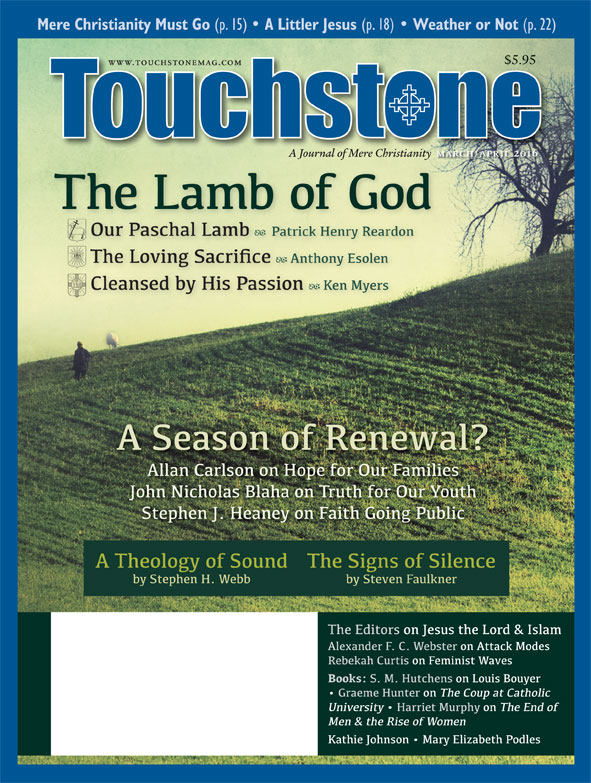Editorial
The Only Lord We Know
On the Confession of the One True God
Every Easter Season, Christians read about the Apostle Thomas kneeling in worship before the Risen Christ and confessing him as "My Lord and my God." How could a Jew say this to a man? The man before whom Thomas knelt bore scars from a crucifixion. What sort of God is this that we Christians worship?
It is reasonable, we suppose—or at least natural—for modern students of religion to wonder how the earliest Christians, all of them Jews, were able to reconcile their belief in the deity of Christ with the monotheism enshrined in Israel's Sh'ma (Deut. 6:4). Indeed, historians of Christian thought have devoted many studies to that inquiry. Looking at the apostolic writings through the lens of this inquiry, we gain an interesting impression of the earliest Christians: their confession of the deity of Jesus, while it was difficult, seems not to have been complicated.
First, the recorded difficulty of the apostles was not an impasse of reason ("How can this Jesus be both God and man?") but a failure of perception ("They did not understand about the loaves, because their hearts were hardened"—Mark 6:52; cf. 8:13–21).
Second, when they did arrive at this profession, in due course, the journey was not complicated. Their arrival did not result from a subtle mental process ("Well, let's see, perhaps he is one person in two natures") but from an immediate experience involving both Jesus' identity and their own destiny: "You have the words of eternal life, and we have come to believe and to know that you are the Holy One of God (ho Hagios tou Theou)" (John 6:68–69).
It is most significant that the two verbs introducing Peter's confession here—"to believe and to know"—are expressed in the Greek perfect tense: pepistevkamen kai egnokamen. The nuance of the expression is subtle; the apostles, when they reflect on what they now confess, perceive that they already know the identity of Jesus. Even though they have not figured it out, they discover it is already an established conviction—a prior, implicit knowledge of Jesus' identity. Peter, faced abruptly with the question of leaving Jesus ("Will you also depart?"), immediately discerns why he and the others cannot do it: they know who he is! Abandoning him, they would forfeit eternal life.
The apostles are making, rather, a basic creedal statement. In its full form, it runs like this: "I believe in one Lord, Jesus Christ." He is one Lord, because—as all Jews know (and would lovingly die for)—"the Lord is one" (Deut. 6:4; Eph. 4:5). Jesus is identified in the terms of the Sh'ma. In the Bible, monotheism is about identity.
The apostles make this step in response to Jesus' assertion, "I came forth from the Father" (exselthon para tou Patros) (John 16:28). They affirm this claim, not because of a religious theory that warrants it, but because, as they watch and listen to Jesus, they discern in him the One who sent him: "He who sees me sees him who sent me" (John 12:45). "He who has seen me has seen the Father" (14:9).
A Matter of Identity
Modern students of religion, regarding the matter as an intellectual dilemma, try to imagine how the apostles, when they affirmed Jesus' deity, were able—as a step of logic—to reconcile that affirmation with their monotheism. In the apostolic corpus, however, there is not the slightest indication that the apostles experienced Jesus' deity as an intellectual problem. What, then, did the apostles suppose that modern students of religion do not suppose?
It is this: for modern students of religion—generally speaking—monotheism involves a fundamentally mathematical thesis, "There is one God," as distinct from "more or fewer" than one God; start counting gods, and when you get to one, stop counting. Consequently, all those who believe in one God must logically believe in the same God.
This approach to monotheism is what allows our contemporaries to speak of "the monotheistic religions." Their thesis is simple: "Since there is only one God, all those who believe in one God believe in the same God. Their differences are those of development and/or expression."
This thesis is not only simple; it is simply absurd. Biblical monotheism is not about mathematics; it is about God's identity: Who is this one God? Who he is, is the essential question. We may cite a noted authority on the point, "If the Lord is God, follow him: but if Baal, then follow him" (1 Kings 18:21).
Elijah knew, of course, that Baal belonged to a pantheon, but this consideration was not to the point. Baal was not a false god because he had relatives; he was a false god because he was not "the Lord, our God—Adonai Eloheinu." Elijah's monotheism was not a matter of counting but of identifying. The question was not, How many gods? but Who is God?
And this is the reason the confession of Jesus never became, in the eyes of the Church, a challenge to biblical monotheism. In the Christian faith, Jesus is divine because he pertains to—is included in—the identity of God. Gradually this truth became perfectly clear to certain fishermen, an improbable tax collector, and some women of their company. Their conviction on the point was a big and difficult step, but it wasn't complicated.
Impossible Identification
What does seem complicated to many today, even to some Christians, is the question of whether Muslims and Christians adhere to the same God. Quite a number of our contemporaries simply assume that the God of "the Abrahamic faiths" must be somehow "shared" by all. This identification is far from obvious.
First and foremost, if we have in mind what Islam and Christianity formally hold as articles of faith, then this identification is difficult to sustain. Islam explicitly teaches—as a fundamental thesis—that Allah has no son. The Christian faith explicitly teaches that we only know the One True God through "the Only Begotten, himself being God (Theos ho on) in the bosom of the Father" (John 1:18). When a Muslim looks at Jesus Christ, he is supposed to see a prophet, second only to Mohammed.
And the Jesus of the Koran was not crucified. When a Christian looks upon Jesus Christ, he sees the revelation of the glory of the only true God in the Crucified Christ. We worship Jesus Christ as God. Islam does not. We assert that there is no other name under heaven given among men whereby we must be saved, than that of Jesus Christ. There is no other salvation except through his Cross; there is no mediator between God and man other than Jesus Christ.
Individual Intimations
It seems important to recognize, however, that the incompatibility of the Islamic doctrine of God with the Christian revelation of God in Christ does not imply that a specific individual Muslim can never be on the path to the same God as confessed by the Christian. Paul preached to the Athenians that God had determined that all men "should seek God, in the hope that they might feel after him and find him" (Acts 17:27). This implies that there is some possibility of men experiencing intimations—personal revelations of the one true God. Scripture records the experiences of gentiles receiving revelations from God—see the gentile centurion Cornelius in Acts 10. The mysterious figure of Melchizedek, priest of "God Most High" without benefit of the revelation to Abraham, is cited as a foreshadowing of Christ the High Priest.
In modern times, there are numerous reliable reports and testimonies of Muslims converting to faith in Christ because of dreams, visions, and revelations of Christ. What can we say of their experience of God and relationship to Christ beforehand? Not much, surely; whatever light from God they experienced and were faithful to, at some point it blazed forth and revealed the full identity of Christ to them. It may even come to them as a revealing of what they have already begun to know in some measure.
While we rightly judge between Islam and the Christian faith, we are less equipped or licensed to judge individuals. Many consciences, we suspect, may be honestly desiring or seeking something that only Christ can give. But one thing would seem reasonable to hold: any Muslim who believes that Christians must be subjugated and convert to Islam cannot be worshiping the same God as the Christians. Such a god demands that Christians contradict the confession of the Apostle Thomas, and deny that Jesus is Lord and God.
Further, our God does not coerce, and Jesus, the Son of God, did not coerce his own followers, but allowed them to see with their own eyes, touch with their own hands, and experience in their own burning hearts that he has the words and power of eternal life. The doubt of Thomas was not erased by logic, but by a personal invitation to place his hands in the marks of the nails. For in the end, there is no true worship of God without "Christ and him crucified." •
James M. Kushiner is the Director of Publications for The Fellowship of St. James and the former Executive Editor of Touchstone.
Patrick Henry Reardon is pastor emeritus of All Saints Antiochian Orthodox Church in Chicago, Illinois, and the author of numerous books, including, most recently, Out of Step with God: Orthodox Christian Reflections on the Book of Numbers (Ancient Faith Publishing, 2019).
subscription options
Order
Print/Online Subscription

Get six issues (one year) of Touchstone PLUS full online access including pdf downloads for only $39.95. That's only $3.34 per month!
Order
Online Only
Subscription

Get a one-year full-access subscription to the Touchstone online archives for only $19.95. That's only $1.66 per month!
bulk subscriptions
Order Touchstone subscriptions in bulk and save $10 per sub! Each subscription includes 6 issues of Touchstone plus full online access to touchstonemag.com—including archives, videos, and pdf downloads of recent issues for only $29.95 each! Great for churches or study groups.
Transactions will be processed on a secure server.
more from the online archives
calling all readers
Please Donate
"There are magazines worth reading but few worth saving . . . Touchstone is just such a magazine."
—Alice von Hildebrand
"Here we do not concede one square millimeter of territory to falsehood, folly, contemporary sentimentality, or fashion. We speak the truth, and let God be our judge. . . . Touchstone is the one committedly Christian conservative journal."
—Anthony Esolen, Touchstone senior editor









